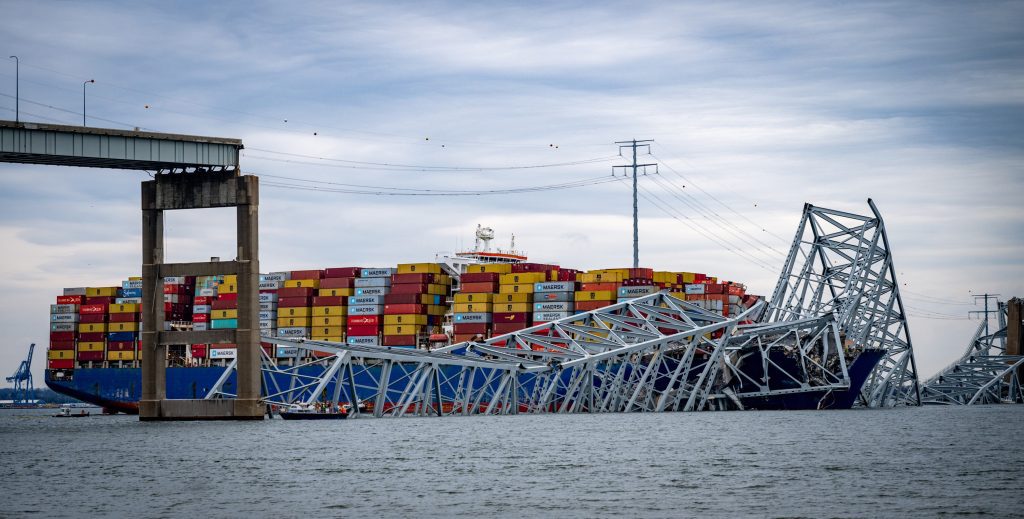Last week, when Baltimore and the world found out that the Francis Scott Key Bridge had collapsed, the families of six men experienced a more personal loss.
It is believed that six construction workers died when a Singapore-flagged container ship, the Dali, crashed into a key support column, causing the bridge and the workers on it to fall into the Patapsco River.
The night shift crew started working on the evening of March 25, fixing potholes on Interstate 695. After a distress call from the ship the next morning, police successfully stopped car traffic onto the bridge just before it collapsed, but warnings did not reach most of the workers in time. Most of the workers did not receive the warnings in time.
One member of the Brawner Builders crew was rescued and treated at a hospital, and a bridge inspector also survived.
Baltimore’s The Latino community is mourning the loss of the six lives and coming together to support the families. For some, the deaths of these men represent the risks that many Latin American immigrants take when they work dangerous jobs in the United States to provide for their families' futures.
The men who died were from Mexico, Honduras, Guatemala, and El Salvador. The youngest were in their 20s, and the oldest was a 49-year-old grandfather.
Miguel Luna, 49
Luna, who was from California in El Salvador, moved to the United States about 19 years ago, according to CASA, a nonprofit that supported him as a member.
He became a welder and lived in Glen Burnie. In his free time, he often cooked with his wife, who runs a food truck called Pupuseria Y Antojitos Carmencita Luna in Glen Burnie. Friends described Luna as a hardworking family man with three children and also a grandfather. One friend remembered their time playing professional soccer together in El Salvador as young men, and said Luna was a skilled defender.
Miguel Luna, victim of Key Bridge collapse, was a kindhearted family man from El Salvador
Alejandro “Alex” Hernandez Fuentes, 35
Hernandez was the supervisor of the crew working on the bridge that night. Former colleagues described him as a dedicated worker who advanced at Brawner Builders from a laborer to driving a company truck.
Hernandez was a devout Christian who often encouraged his coworkers to listen to religious radio stations as they traveled between jobs. Born in Mexico and living in Essex, he left behind a wife and four children. His body was found submerged in the Patapsco last week, inside a red pickup truck. Hernandez’s brother-in-law Julio was also on the bridge crew on March 26 but survived the collapse, a former colleague said.
Maynor Yassir Suazo Sandoval, 38
The youngest of eight siblings, Suazo Sandoval grew up in Azacualpa, Honduras. He moved to the United States over 17 years ago, and often sent money back to his hometown, even sponsoring a soccer league. He had a wife and two children and lived in Owings Mills.
Skilled with machinery, he aspired to start his own business one day, according to CASA, of which Suazo Sandoval was a member. In his free time, he enjoyed visiting parks and beaches with his wife and young daughter, according to his brother Carlos. who went to the Patapsco River on Friday to observe the wreckage and sent videos to his family members.
Awaiting closure, Maynor Suazo Sandoval’s family remembers him as a happy provider
Dorlian Ronial Castillo Cabrera, 26
Born in Guatemala, Castillo Cabrera lived in the Baltimore area. Relatives living at a Dundalk address listed for him said they were not ready to speak to reporters. A friend named Melvin Ruiz, of Baltimore, told The Baltimore Sun that Castillo Cabrera was a kind person with a joyful sense of humor.
Castillo Cabrera regularly volunteered to drive fellow crew members to work and other members of Baltimore’s Latino community to the store or to various appointments as needed, Ruiz said.
“He was a genuinely selfless person,” Ruiz said.
Elba Yanez, who cut his hair at a Patapsco Avenue barber shop, described him as sweet. Castillo’s body was recovered last week in the submerged truck, alongside Alex Hernandez. He was originally from San Luis, Petén, according to the Consulate General of Guatemala in Maryland.
Jose Mynor Lopez, in his 30s
Lopez, described as a loving family man and an attentive father, came to the United States 19 years ago from Guatemala to create better opportunities for his family.
He had four children, including a young daughter, his uncle Wilmer Raul Orellana said. His wife worked at Owls Corner Cafe in Dundalk, according to his friend and former coworker Melvin Ruiz. A co-owner of the cafe set up a GoFundMe to raise money for his family.
For much of his time in the U.S., Lopez worked in Virginia for Marksmen, a Baltimore bridge repair and marine construction company. Lopez had taken a job with Brawner and moved to the Baltimore about a year ago. He lived in Dundalk.
Carlos Hernandez
Other news outlets have identified Carlos Hernandez as one of the victims who died on the bridge. The Mexican embassy told The Sun that three Mexicans were working on the bridge when it collapsed, including the man who survived. The Mexican state of Michoacán told CNN that the three Mexican men — Carlos Hernandez, Alejandro Hernandez, and Julio — were related to one another.
Baltimore Sun reporter Jonathan M. Pitts contributed to this article.









